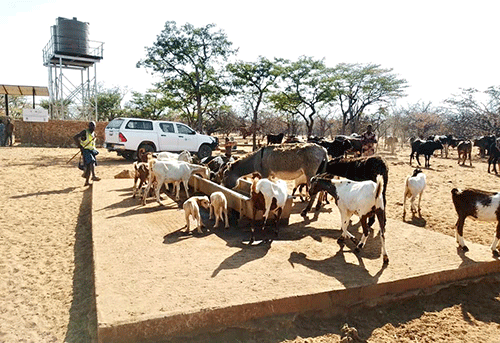OMBAMBIHAKA – Five northern regions received 20 boreholes from the Ministry of Environment through the Namibia Integrated Landscape Approach for Enhancing Livelihood and Environmental Governance (NILALEG).
The boreholes, drilled at an amount of over N$14.4 million, were handed over to the Ministry of Agriculture, Water and Forestry at Ombambihaka village in the Omusati region on Friday.
The boreholes will benefit five project landscapes of NILALEG, which are Omusati, Ohangwena, Kavango West, Kunene and Zambezi regions.
Minister of Agriculture, Water and Forestry, Calle Schlettwein, in a speech read on his behalf, said the project is aimed at providing extension support to promote agroforestry and sustainable crop as well as rangeland management across at least 15 000 hectares
“NILALEG project supported the drilling and installation of the boreholes with funding from the Global Environmental Facility (GEF) through the United Nations Development Programme (UNDP) Namibia,” he stated.
He added that the project emphasises the effective resources governance framework and markers, provision of incentives for livestock off-take, and compliance with sustainable land management.
“I am particularly delighted that the project has successfully drilled and revamped 20 boreholes within the five landscapes, including the provision of maintenance equipment for the boreholes.
We are happy, as a ministry, that the project did not overly promote environmental conservation alone, but also paid attention to balancing this with the need to improve livelihoods through numerous interventions, the constraints faced by farmers. The need to balance the economic, social and environmental pillars of sustainable development were reiterated,” Schlettwein noted.
He indicated they know and understand that the funds mobilised from the GEF were only possible due to hard work and collaboration between the UNDP and the government of Namibia, which partnership is encouraged, going forward.
Environment minister Pohamba Shifeta said the boreholes will support 6 790 people directly, impacting 805 households, including 34 000 head of livestock.
In addition to the drilling and installation of boreholes, the project has provided training and repairs equipment for the water committees in those areas, where the boreholes have been drilled or refurbished.
“Extension services are at the centre of the NILALEG Project, and were identified as a critical ingredient in both forestry and agricultural development,” he added.
Shifeta said the work done to drill or repair boreholes by the project in partnership with the extension service department within the ministry of agriculture is a clear testimony that different government agencies can make things happen for the betterment of the people.
UNDP representative Alka Bhatia said, “Through the provision of reliable water sources, [the] project has enabled the establishment of nurseries, and facilitated tree-planting activities in schools and communities, contributing to environmental restoration and sustainable land management,” she said.
She further said those boreholes have had a transformative impact on the communities in the five target landscapes.
Bhatia also urged the communities who benefitted from the project to take ownership of the water infrastructure, and ensure its proper maintenance and management.



